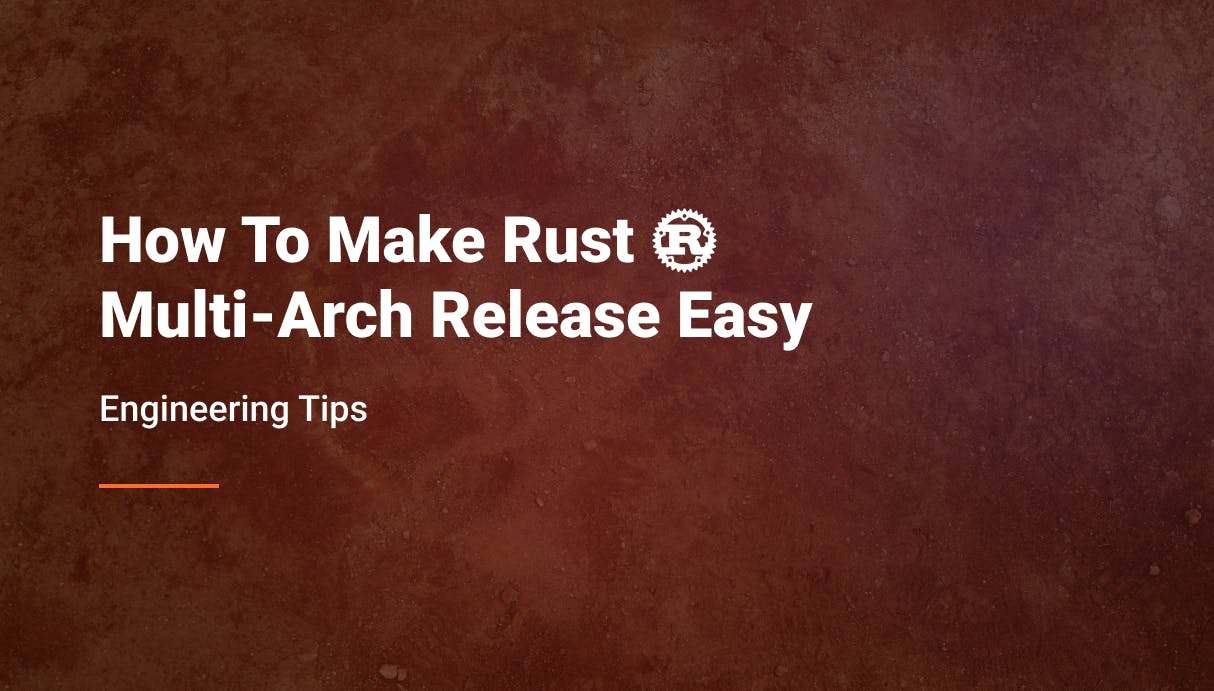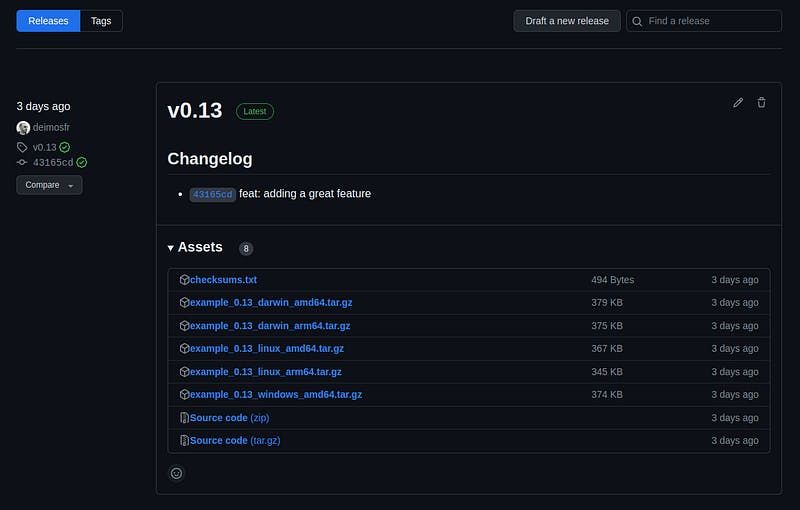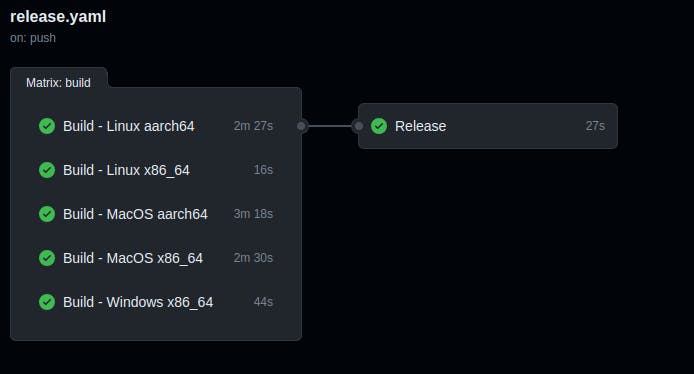How To Make Rust Multi-Arch Release Easy
At Qovery, we're using Rust for 10+ projects. If you are familiar with Rust, you know how painful it is to release a binary for multiple architectures. Even if the toolchain natively supports it.

Pierre Mavro
October 10, 2023 · 6 min read
With Go, there is a fantastic tool called GoReleaser, which allows you to:
- Compile for all architectures you want binaries
- Create a release on your favorite Git provider
- Automatically generate the changelog based on commits between the current the previous version
- Manage repositories for Linux (Arch), MacOs (HomeBrew), and Windows (Scoop/Winget).
- Generate binaries checksums
- And many other things

Once you’ve used GoReleaser, it’s hard to go back. I looked at Rust alternatives but unfortunately didn’t find one with the expected level of features. This is why I tried to use GoReleaser with Rust and naïvely thought it would be as simple as go, as I knew Rust was also made to be multi-architecture. Unfortunately, the reality is more complex than I expected. I found several tutorials, blog posts, and discussions around it, but nothing ready to set up in 5 min.
This is why I started to make a template to build multi-architecture binaries on Rust, with GitHub Action and GoReleaser. The goal is to build binaries for:
- Linux (Aarch64 & x86_64)
- MacOs (Aarch64 & x86_64)
- Windows (x86_64)
#Rust project
Before digging into GitHub action, I'm using a fresh, newly created Git repository, create a Rust hello world (example), and move the source into the repository:
git clone git@github.com:<username>/<repo>.git
cargo new example
mv example/* .
rmdir exampleThe Cargo.toml can be tuned to optimize the binary size on the release build:
[package]
name = "example"
version = "0.1.0"
edition = "2021"
[dependencies]
[profile.release]
strip = true
opt-level = "z"
codegen-units = 1#GitHub Action pipeline
First, create a DockerHub token to pull (and avoid access being denied) a MacOS image containing the required libs for cross-compilation (thanks a lot to this project for the work).
Now that I have a Rust code example, I’m using a GitHub workflow as follows (.github/workflows/release.yaml):
on:
# Indicates I want to run this workflow on all branches, PR, and tags
push:
branches: ["**"]
tags: ["*"]
pull_request:
branches: [ "main" ]
env:
# Define the rust version to use
RUST_VERSION: 1.72.1
# Rust build arguments
BUILD_ARGS: "--release --all-features"
# The binary name
BIN_NAME: "example"
# Docker token required to pull images from DockerHub
DOCKER_LOGIN: ${{ secrets.DOCKER_LOGIN }}
DOCKER_TOKEN: ${{ secrets.DOCKER_TOKEN }}
jobs:
build:
name: Build - ${{ matrix.platform.name }}
# By default, runs on Ubuntu, otherwise, override with the desired os
runs-on: ${{ matrix.platform.os || 'ubuntu-22.04' }}
strategy:
matrix:
# Set platforms you want to build your binaries on
platform:
# Linux
# The name is used for pretty print
- name: Linux x86_64
# The used Rust target architecture
target: x86_64-unknown-linux-gnu
- name: Linux aarch64
target: aarch64-unknown-linux-gnu
# Mac OS
- name: MacOS x86_64
target: x86_64-apple-darwin
- name: MacOS aarch64
target: aarch64-apple-darwin
# Windows
- name: Windows x86_64
# Use another GitHub action OS
os: windows-latest
target: x86_64-pc-windows-msvc
steps:
- name: Checkout Git repo
uses: actions/checkout@v3
# Linux & Windows
- name: Install rust toolchain
if: ${{ !contains(matrix.platform.target, 'apple') }}
uses: actions-rs/toolchain@v1
with:
# We setup Rust toolchain and the desired target
profile: minimal
toolchain: "${{ env.RUST_VERSION }}"
override: true
target: ${{ matrix.platform.target }}
components: rustfmt, clippy
- name: Build ${{ matrix.platform.name }} binary
if: ${{ !contains(matrix.platform.target, 'apple') }}
uses: actions-rs/cargo@v1
# We use cross-rs if not running on x86_64 architecture on Linux
with:
command: build
use-cross: ${{ !contains(matrix.platform.target, 'x86_64') }}
args: ${{ env.BUILD_ARGS }} --target ${{ matrix.platform.target }}
# Mac OS
- name: Login to DockerHub
if: contains(matrix.platform.target, 'apple')
# We log on DockerHub
uses: docker/login-action@v3
with:
username: ${{ env.DOCKER_LOGIN }}
password: ${{ env.DOCKER_TOKEN }}
- name: Build ${{ matrix.platform.name }} binary
if: contains(matrix.platform.target, 'apple')
# We use a dedicated Rust image containing required Apple libraries to cross-compile on multiple archs
run: |
docker run --rm --volume "${PWD}":/root/src --workdir /root/src joseluisq/rust-linux-darwin-builder:$RUST_VERSION \
sh -c "CC=o64-clang CXX=o64-clang++ cargo build $BUILD_ARGS --target ${{ matrix.platform.target }}"
- name: Store artifact
uses: actions/upload-artifact@v3
with:
# Finally, we store the binary as GitHub artifact for later usage
name: ${{ matrix.platform.target }}-${{ env.BIN_NAME }}
path: target/${{ matrix.platform.target }}/release/${{ env.BIN_NAME }}${{ contains(matrix.platform.target, 'windows') && '.exe' || '' }}
retention-days: 1
release:
name: Release
needs: [build]
# We run the release job only if a tag starts with 'v' letter
if: startsWith( github.ref, 'refs/tags/v' )
runs-on: ubuntu-22.04
steps:
- name: Checkout Git repo
uses: actions/checkout@v3
# Download all artifacts
- uses: actions/download-artifact@v3
with:
path: artifacts
# Goreleaser
- name: Set up Go
uses: actions/setup-go@v4
- name: Run GoReleaser
uses: goreleaser/goreleaser-action@v5
with:
distribution: goreleaser
version: latest
# Run goreleaser and ignore non-committed files (downloaded artifacts)
args: release --clean --skip=validate
env:
GITHUB_TOKEN: ${{ secrets.GH_TOKEN_RUST_CROSS }}#Goreleaser
Now, the setup is made; the last part is Goreleaser. As you certainly understand, we first build binaries, then use GoReleaser to perform the packaging and release. As GoReleaser is not able to build Rust code and requires to build something, we have to create an empty Go code and build it (goreleaser.go):
package main
func main() {
}Then, replace the generated binaries with the Rust ones with a hook calling a shell script (.goreleaser_hook.sh):
#!/usr/bin/env bash
go_arch=$1
go_os=$2
project_name=$3
# Make Go -> Rust arch/os mapping
case $go_arch in
amd64) rust_arch='x86_64' ;;
arm64) rust_arch='aarch64' ;;
*) echo "unknown arch: $go_arch" && exit 1 ;;
esac
case $go_os in
linux) rust_os='linux' ;;
darwin) rust_os='apple-darwin' ;;
windows) rust_os='windows' ;;
*) echo "unknown os: $go_os" && exit 1 ;;
esac
# Find artifacts and uncompress in the corresponding directory
find artifacts -type f -name "*${rust_arch}*${rust_os}*" -exec unzip -d dist/${project_name}_${go_os}_${go_arch} {} \;To finish, we set the GoReleaser configuration to the same architectures:
project_name: example
builds:
- main: goreleaser.go
goos:
- linux
- darwin
- windows
goarch:
- amd64
- arm64
binary: example
ignore:
- goos: windows
goarch: arm64
hooks:
post:
- ./.goreleaser_hook.sh {{ .Arch }} {{ .Os }} {{ .ProjectName }}
checksum:
name_template: "checksums.txt"
changelog:
sort: asc
filters:
exclude:
- "^docs:"
- "^test:" Now, push the code to the repository. Create and push a tag, and you'll see your GitHub Action processing:

You can admire the result in the Release tab when everything is finished.
As you can see, building a hello world with cross-compilation takes a longer time (Mac OS and Linux aarch64) than if you would build directly on the target architecture and operating system (Linux and Windows x86_64).
It’s up to you to find a good balance between easy repeatability and speed, depending on your needs.
#Bonus
To give you a concrete example of how GoReleaser is powerful on the packaging part, here is a configuration example of how to let it manage the HomeBrew repository. Append this configuration to your .goreleaser.yaml file:
brews:
- name: <example>
goarm: 6
tap:
owner: <tap-owner>
name: <git-repository-name>
url_template: "https://github.com/<username>/<example-repository-name>/releases/download/{{ .Tag }}/{{ .ArtifactName }}"
commit_author:
name: <Author Name>
email: <email@address.com>
folder: Formula
homepage: "https://github.com/<username>/<example-repository-name>"
description: "A description"
skip_upload: false#Conclusion
Combining GoReleaser, Rust, and GitHub Action makes multi-architecture compilation simpler. It still requires some work, so we have made a template to clone/fork and save time. We hope this will bring value to the beloved Rust and GoReleaser community. We made this because we love Rust at Qovery and want Rust to be easily adopted :)
Your Favorite DevOps Automation Platform
Qovery is a DevOps Automation Platform Helping 200+ Organizations To Ship Faster and Eliminate DevOps Hiring Needs
Try it out now!

Your Favorite DevOps Automation Platform
Qovery is a DevOps Automation Platform Helping 200+ Organizations To Ship Faster and Eliminate DevOps Hiring Needs
Try it out now!

